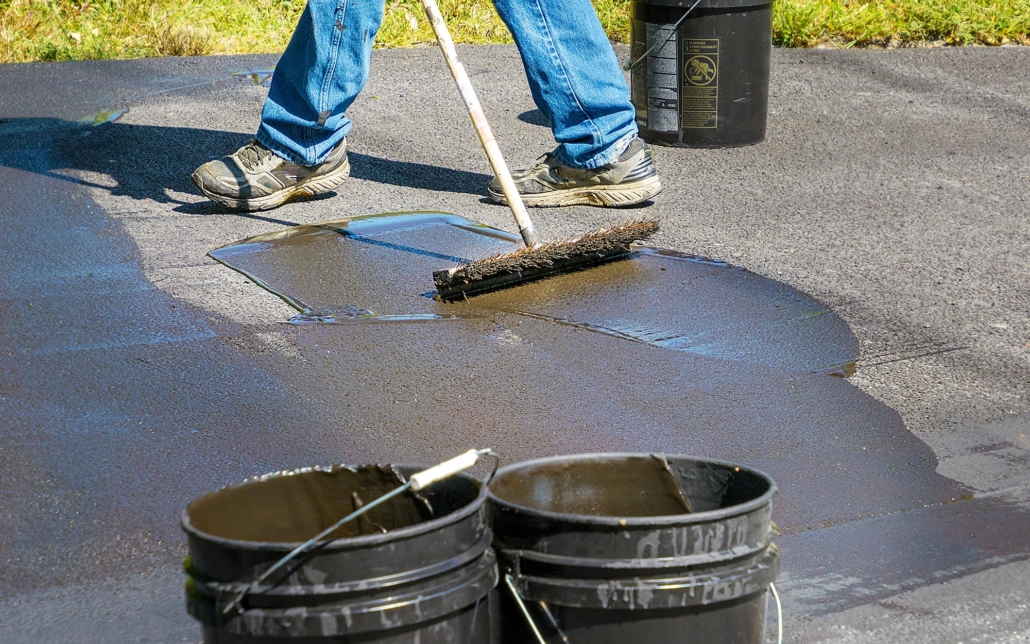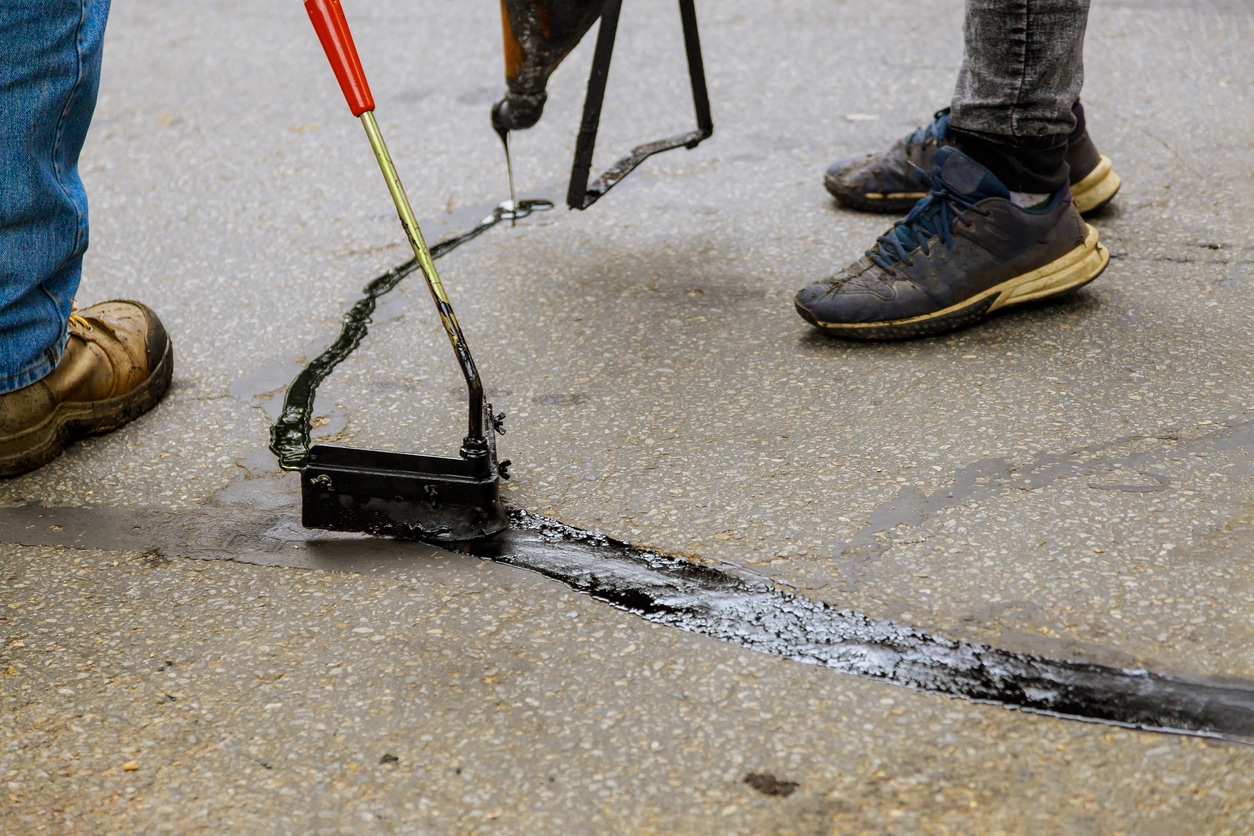Renew Your Residential Or Commercial Property with Regrading and Asphalt Sealing Methods
Warm Mix Asphalt: A Lasting Remedy for Pavement
Hot Mix Asphalt (HMA) has actually arised as a leading sustainable choice for sidewalk remedies, supplying a myriad of ecological advantages and cutting-edge innovations. As the need for environment-friendly construction methods grows, exploring the subtleties of HMA's sustainability can give valuable understandings into the future of pavement services.
Environmental Advantages of Warm Mix Asphalt

Additionally, Warm Mix Asphalt helps to alleviate urban warm island results. Its dark shade absorbs sunshine, lowering the amount of warm mirrored back into the ambience contrasted to lighter-colored sidewalks. This can lower ambient temperatures in city areas, decreasing the demand for a/c and eventually reducing power consumption.
In enhancement, Hot Mix Asphalt adds to boosted stormwater monitoring. Its porous nature allows water to penetrate the sidewalk and reenergize groundwater supplies, reducing overflow and the danger of flooding. These environmental benefits make Warm Mix Asphalt a lasting choice for leading roadways and freeways.
Energy Effectiveness in HMA Manufacturing
Is energy efficiency a crucial element in the production of Warm Mix Asphalt (HMA)? Energy plays a significant duty in the manufacturing of HMA, affecting both cost and ecological sustainability. One vital facet of power effectiveness in HMA production is the usage of warm mix asphalt (WMA) technologies.
In addition, innovations in plant innovations have brought about more energy-efficient HMA manufacturing processes. Modern plants are designed with attributes like recycled asphalt sidewalk (RAP) processing capacities, efficient heater systems, and boosted insulation, all adding to power cost savings. By maximizing power usage in HMA production, the sector can minimize its carbon impact while preserving top quality sidewalk materials. Power efficiency is, as a result, an important consideration in making certain the sustainability of Hot Mix Asphalt manufacturing.
Recyclability of Warm Mix Asphalt
The recyclability of Warm Mix Asphalt (HMA) is a pivotal element of its sustainability and lasting environmental impact. HMA is among one of the most recycled products in the United States, with over 100 million heaps of redeemed asphalt pavement (RAP) being reused yearly in brand-new sidewalk building and construction. Recycling HMA offers a number of ecological advantages, such as lowering the need for virgin materials, lowering energy usage throughout manufacturing, and lowering the quantity of waste sent out to land fills.
The procedure of recycling HMA involves crushing the existing sidewalk, crushing it into smaller sized pieces, and blending it with new aggregate and asphalt binder to produce a recycled mix. Overall, the recyclability of HMA plays a substantial duty in promoting sustainable methods within the pavement sector.

Long-Term Efficiency of HMA
Asphalt pavements show durability and strength website here over a prolonged period, mirroring the long-lasting performance of Hot Mix Asphalt (HMA) The longevity of HMA can be attributed to its ability to endure hefty web traffic loads, extreme weather, and the impacts of aging. Research studies have shown that well-designed and correctly built HMA pavements can last for 20 years or even more with normal upkeep. The secret to making best use of the lasting efficiency of HMA hinges on using high-quality products, adhering to finest methods in construction, and implementing reliable upkeep techniques. Proper drainage, regular inspections, and timely repair work are important for protecting the structural honesty of HMA pavements over time. In addition, improvements in HMA innovation, such as using polymer-modified binders and cozy mix asphalt, have further boosted the sturdiness and longevity of HMA sidewalks. By prioritizing top quality building and upkeep methods, HMA proceeds to prove itself as a sustainable and cost-efficient option for long-lasting sidewalk infrastructure.

HMA: Sturdiness and Sustainability
Demonstrating both sturdiness and sustainability, Warm Mix Asphalt (HMA) has actually become a foundation in the construction of durable pavement facilities - regrading. HMA's durability originates from its ability to hold up against hefty loads, extreme climate condition, and high website traffic quantities, making it a his explanation trustworthy choice for highways, highways, and airport paths. The make-up of HMA, which usually consists of aggregates, binder, and filler, plays a vital role in improving its long life and resistance to wear and Going Here tear
Moreover, HMA's sustainability exists in its recyclability and energy-efficient production procedure. The ability to recycle redeemed asphalt sidewalk (RAP) in new HMA mixtures reduces the demand for virgin materials and reduces the ecological influence of sidewalk construction and maintenance. Furthermore, the power performance of producing HMA hinges on its lower mixing temperature levels contrasted to various other sidewalk products, leading to decreased energy usage and greenhouse gas discharges.
Verdict
In verdict, warm mix asphalt (HMA) uses a lasting remedy for sidewalk with its eco pleasant features. HMA's recyclability, power effectiveness in production, and long-term sturdiness make it an eco-friendly choice for roadway building and construction. By preserving all-natural sources, minimizing waste, and reducing greenhouse gas discharges, HMA plays an important function in promoting sustainability in infrastructure growth. Its capacity to alleviate metropolitan warm island effects further emphasizes its relevance in producing durable and environmentally conscious sidewalk systems.
HMA is one of the most recycled products in the United States, with over 100 million heaps of reclaimed asphalt sidewalk (RAP) being recycled annually in new sidewalk building and construction.The procedure of recycling HMA includes crushing the existing pavement, crushing it right into smaller sized items, and mixing it with brand-new aggregate and asphalt binder to develop a recycled mix.Asphalt pavements show resilience and strength over an extensive duration, mirroring the long-term performance of Hot Mix Asphalt (HMA) Furthermore, advancements in HMA technology, such as the usage of polymer-modified binders and warm mix asphalt, have better improved the durability and durability of HMA sidewalks. The ability to recycle redeemed asphalt pavement (RAP) in brand-new HMA combinations decreases the need for virgin products and reduces the ecological influence of pavement building and upkeep.